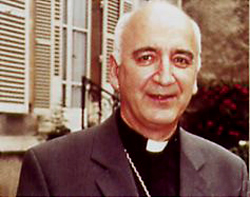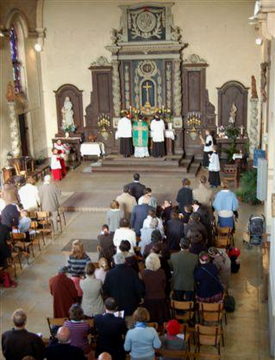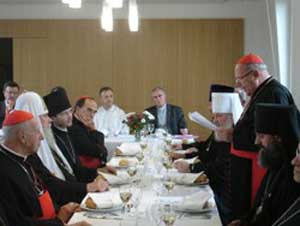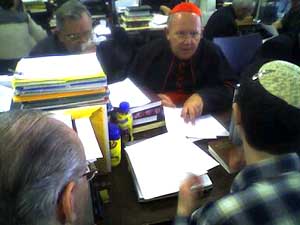 |
Traditionalist Issues
Liturgical Peace or Liturgical Apartheid?
André Garcia, Brazil
An unknown document written in 1998 was recently brought to public attention by the French movement Paix Liturgique [Liturgical Peace], which accepted the protocols of the Ecclesia Dei Commission. The document was authored by a specialist in Traditionalism, Thierry Jordan, then Archbishop of Reims. It was addressed to the French Bishops Conference under the title: “Ecclesia Dei Distressed: Ten Years Later - A Canonical Analysis” (1).
According to Liturgical Peace, this document explains the policy of religious discrimination that has been adopted by the French Episcopate since the Apostolic Letter Ecclesia Dei by John Paul II on July 2, 1988. The leaders of Liturgical Peace – who also adhere to the terms of the motu proprio of Benedict XVI – are upset about the escalating rigorous treatment they are receiving from the Bishops and clergy. Because they are not in “full communion” with the progressivist Bishops and priests, they believe they are victims of a “culture of scorn” and are suffering a cruel liturgical apartheid.
An elastic interpretation of ‘communion with the Bishops’
At the root of this severe treatment is a canonical argument. Archbishop Jordan’s document recognizes that these traditionalists could not be considered schismatics according to the first part of canon 751 of the 1983 Code, since they do not refuse submission to the Sovereign Pontiff. The canon says that schism is the "withdraw of submission to the Supreme Pontiff or from communion with the members of the Church subject to him.”

Archbishop Jordan feeds the rigor of the French Bishops toward traditionalists |
However, based on the provisions of the second part of the quoted canon, Jordan raises the suspicion that those traditionalists who have agreed to the Ecclesia Dei requirements are not in “full communion” with the French Episcopate. This lack of communion would be schismatic. The systematic critique of the New Mass, the Bishops and the Conciliar Church made in these milieus would not be “a positive sign of communion.”
Further, Jordan accused these traditionalists of forming “a practically autonomous ecclesial current” in relation to the Episcopate. Such current, sufficient unto itself, would thereby lack “organic ecclesial communion” and be suspicious of schism.
We have, therefore, a pastoral siege on Traditionalism, which recalls the French Revolution when the Law of Suspects was in effect. Anyone could be put in jail and condemned to death for a mere suspicion of not adhering completely to the Revolution. Today also, a mere suspicion of a behavior “with schismatic tones” suffices for the Episcopate to unleash a condemnation and mete out rigorous treatment on those Catholics. Even the lack of “affective communion” has been alleged as cause for excluding those traditionalists from the Church. In this epoch of inflated ecumenism, the rigor the French Bishops toward those traditionalists, who notwithstanding have submitted to the requirements of Rome, reveals itself as extreme.
A futile compromise
What is the response of these French Catholics obedient to Ecclesia Dei, represented by the Liturgical Peace movement? They lament that the Bishops demand a unilateral “affective communion” and complain that they do not feel themselves respected and loved so long as they remain attached to the Tridentine Mass. For them, Archbishop Jordan’s document demonstrates that the Episcopate has decided to do nothing to apply the regulations of Benedict XVI’s motu proprio. The Bishops systematically block their desired march toward reconciliation and liturgical peace.

The Liturgical Peace movements receives the minimum - a Sunday Tridentine Mass; above, at St. Jeanne d'Arc Church in Reims |
Liturgical Peace members think the French Bishops are conspiring against the traditional Mass, since they continue to follow the same lines that have been applied for more than 30 years.
What should we think about this attitude? In the mentality of these Catholics, there is a propensity to compromise with Progressivism, so long as they are assured Sunday assistance at the Tridentine Mass. To obtain reconciliation and liturgical peace, they accepted liturgical pluralism. Thus they set aside the noble desire to reach peace through the preservation of the full Catholic doctrine. Instead, their liturgical peace is an irenic peace (2) resulting from a relativist coexistence between the Tridentine Mass and New Mass. True peace cannot be obtained through the acceptance of two liturgical rites that have opposed and irreconcilable theological orientations.
To flee a doctrinal polemic with the local Bishop and Holy See, these Catholics have avoided an attitude of resistance toward the Vatican and the French Episcopate. They don’t want to really defend the Tridentine Mass. They don’t want to fight for it, but just to lament the “shameful stratagems” of the French Bishops.
Even though they have compromised, they are still suffering a systematically boycott. If they individually ask their Bishop for the celebration of the Traditional Mass, it is not granted because allegedly they don’t represent a sufficient number of people. But, if they ask for it in a group of dozens or hundreds of families, they also are not granted permission, this time because they would be making an intolerable pressure on the Bishops. Finally, if they have recourse to the Vatican Ecclesia Dei Commission, their requests are also rejected, because they supposedly do not recognize the authority of their Bishops.

French Bishops: rigor with traditionalists but openness toward false religions. Above, Card. Armand Vingt Trois speaks at an ecumenical dinner; below, Card. Jean Pierre Ricard learning the Talmud from Jews
 |
This severity alternates with some appearances of relaxation. At times, the Vatican enters the picture to offer some enticements. First John Paul II and now Benedict XVI appear to these duped Catholics as being protectors of their cause. Some rare papal speeches, a few favors obtained through the Ecclesia Dei Commission reanimate them and renew their hopes.
Normally speaking, this contradictory process of pressure and decompression would lead to a great discontent and enormous frustration. Filming this process in slow motion, its first stage would lead these traditionalists to an attitude of inertia and resignation, discouraging them from requesting the Tridentine Mass. In its second stage, they would begin to seek an “organic ecclesial communion,” that is, to assist indifferently at the Old or New Mass. In the final stage, they would give up the Tridentine Mass and be transformed into convinced progressivists.
However, this march is not following the expected process. What is actually happening is that the grassroots of the compromised factions of French Traditionalism are becoming tired of the Bishops’ persecution, are abandoning their agreements with the Ecclesia Dei Commission and are entering into resistance. They are walking toward other groups - also considered “schismatic” - that have not agreed to the protocols of the Vatican or are under the governance of the French Episcopate.
The most palpable fruit of the regime of liturgical “apartheid” has been to increase the number of Catholics in the state of Resistance.
It is interesting to see that in France - and elsewhere - the middle-of-the-road position of compromise in becoming more and more unsustainable.
1. Letter 133, August 14, 2008. PaixLiturgique.com
2. Irenic, from the Greek eirenikos, favoring peace, conciliation. We consider irenic not in the sense of a tempered love for true peace, but as a disordered love to obtain peace at any price, at the cost of principles, acquired rights, etc.

Posted September 3, 2008

Related Topics of Interest
 Heading to a Hybrid Mass Heading to a Hybrid Mass
 Active vs. Passive Resistance Active vs. Passive Resistance
 Quo Primum vs. Novus Ordo Quo Primum vs. Novus Ordo
 Rifan, Quo Primum and the New Mass Rifan, Quo Primum and the New Mass
 Bishop Rifan's Betrayal Bishop Rifan's Betrayal
 On Resisting the Novelties of the Conciliar Church On Resisting the Novelties of the Conciliar Church
 How a Catholic Should Act in face of Bad Popes How a Catholic Should Act in face of Bad Popes

|

Traditionalism | Hot Topics | Home | Books | CDs | Search | Contact Us | Donate

© 2002- Tradition in Action, Inc. All Rights
Reserved
|
 |
|
